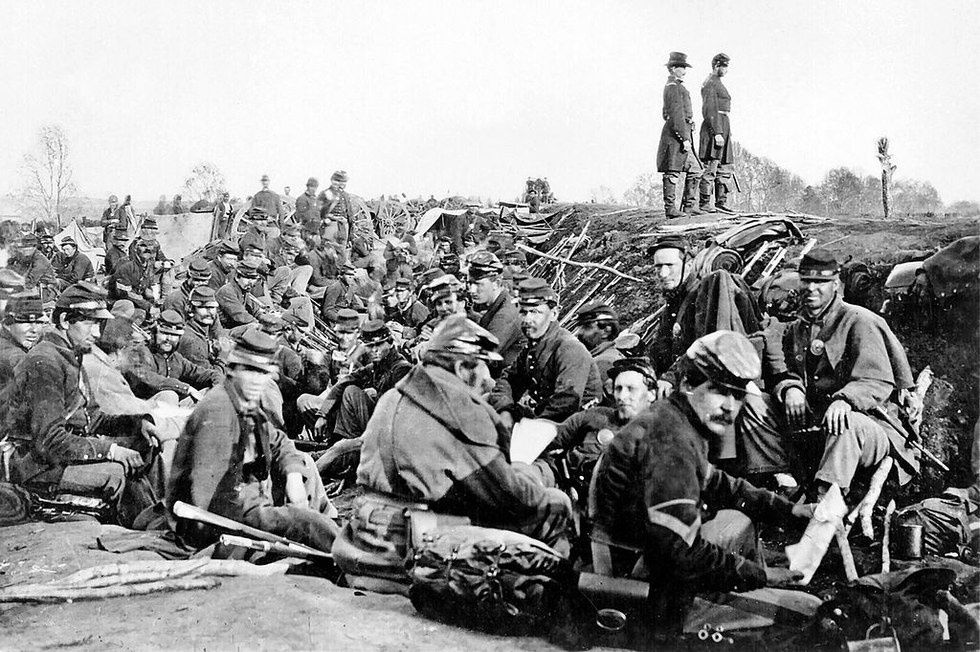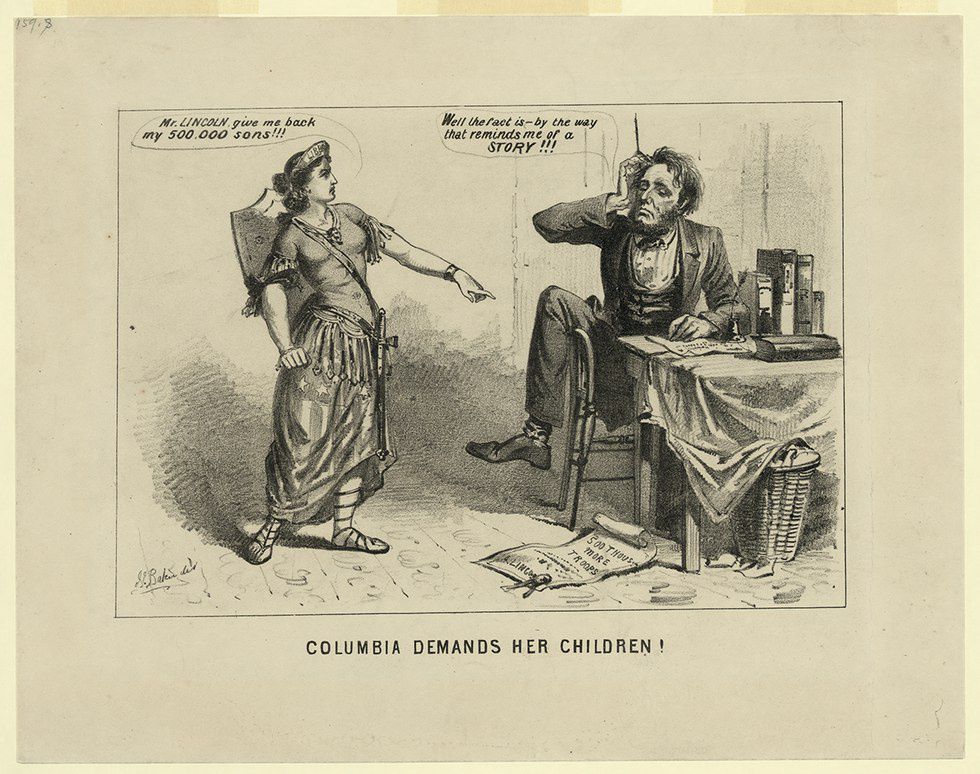I remember one of my favorite games as a child was the Telephone game. If you have never played this game before, a group of kids sit in a row and the person at one end of the line whispers something in the ear of his or her neighbor. Then that person turns to his or her neighbor and whispers the same thing. This goes all the way until the end of the line, when the last person says out loud what he or she heard which is usually nothing like what was whispered the first time. Sometimes our accounts of history are a lot like this game, except worse because many people have their own agenda that they put into the accounts of history. The Civil War is a great example of an account of history that has been put through the line and severely jumbled. So, today, in order to figure out what really happened during the Civil War and clear up the South’s bad reputation, I would like to look at two supposed "facts" about the Civil War. The first is the belief that the South seceded because it wanted to keep slaves. The second is the belief that the North fought the war to free the slaves. Neither of these are precisely true or that simple.
Looking at the first point, if the South didn’t secede to keep its slaves, why did it secede? The South was unhappy with the North for political reasons. According to britannica.comthe Republican Party was formed in 1854 and its platform was largely anti-slavery and pro-tariff taxes. The South’s agricultural-based economy depended on slaves and exporting goods, making the situation very complicated.
In 1860, the first Republican president, Abraham Lincoln, was elected without the support of a single Southern state, according to the Civil War Trust. To no surprise, two months later the first Southern state seceded. In their documents of secession, most of the states did mention slavery as their main reason for secession but it wasn’t simply about their desire to keep slaves. According to The Constitution Center, the 10th Amendment of the United States constitution says: "The powers not delegated to the United States by the Constitution.....are reserved to the States respectively, or to the people." Since slavery was not mentioned anywhere in the constitution, Slavery should have been left up to the states individually.
According to the civil war trust, Texas phrases it nicely in its document of secession when it said: "The Federal Constitution has been violated and virtually abrogated" and because of this we have “passed an ordinance dissolving all political connection with the government of the United States of America."
So, yes, the South was mad at the North for trying to abolish slavery, but not just because they wanted slaves but because they had the constitutional right to pass state laws regarding slavery. In fact, these states rights were so important to the people of the confederacy that, according to ancestory.com, there was a Brigadier General in the Civil War named general States Rights Gist.
The second reason the South seceded was tariffs. Tariffs are, according to Merriam-Webster dictionary, “a tax on goods coming into or leaving a country." In the late 1850s , According to the Mises Institute, the average tariff was 15%, but the Republicans wanted to raise the tariff. In the House of Representatives session of 1859 and 1860, the session preceding Lincoln’s election, a politician by the name of Justin Morrill proposed a tariff which was later named after him, the Morril tariff. According to the Mises institute,'The bill immediately raised the average tariff rate from about 15 percent ...to 37.5 percent". The Senate didn't take up the tariff until the session of 1860 and 1861, but the fact that it passed the House was enough to convince the Southern states that they needed to get out of the Union before they were further oppressed.
But why were the tariffs bad? Around the time of the Civil War, according to Scholistic.com, the North had almost twice as many factories as the South but it produced absolutely no cash crops, like cotton. This meant it needed raw products such as cotton from the South so that it could use them to create finished products, like clothing, in its factories which it would then sell back to the South.
Therefore, the North had very little need for importing and exporting goods. The South, on the other hand, needed finished products and to sell its raw material. The North wasn't always the most cost effective place to buy finished product or to sell raw material to so prior to the first tariff in 1789, according to Encyclopedia.com, the South would buy and sell to other countries if it needed to. The North did not like this because it needed the South's business since other nations didn't have a real need for finished products from America, because they had their own factories.
In order to increase domestic trade and to stop the South from trading with other countries, the government passed protective tariffs which increased the price of imported products like the finished goods the South needed and the price of the raw material that the South would export. This monopoly didn't hurt the North, as I said earlier; it had little need for import and export.
To give you a comparison to the Morril tariff tax, according to Libertyforlife.com, "The Boston Tea Party ...fought over a 2% tax being raised to 5%." That means the South was being taxed by its own government over 5 times more than America was being taxed by Britain when America decided to revolt.
So you see, the South didn't secede because of a desire to enslave other races. It seceded because its rights were being violated and because it was being unfairly taxed. Does that sound familiar to you? It should because those were the reasons for the American Revolution. The only difference is that America won the revolution against Britain and, as many great men have put it, "The victor writes the history."
This brings us to the second point: the North's real reason for the war. Many people believe that the North fought the South because it wanted to end slavery. However, the real reason for the war wasn't slavery. If it had been about slavery then Lincoln would have freed all the slaves as promptly as he could. Yet the Emancipation Proclamation wasn't issued until almost 2 years after the first state seceded. Not only that but according to al.com, "Lincoln did not claim slavery was a reason even in his Emancipation Proclamations on Sept. 22, 1862, ....Moreover, Lincoln's proclamations exempted a million slaves under his control from being freed (including General U.S. Grant's four slaves)."So Lincoln only freed the slaves in the South, even though people in the North still held slaves. Why you ask? Abraham Lincoln knew that if he freed the slaves in the South, he could cripple its economy enough to get the upper hand and retrieve the crop land that it needed. A crippled South was better than no South. He declared war not because he specifically wanted to free the slaves. In fact, according to The Civil War Trust,Lincoln was quoted saying he didn't want to free the slaves and if he did free them it was only because it would help him save the Union.
But why was the Union so important to him? Abraham Lincoln knew the North could not survive without the South. According to Mississippi history now:
"On the eve of the American Civil War in the mid-1800s cotton was America’s leading export, and raw cotton was essential for the economy of Europe. The cotton industry was one of the world’s largest industries, and most of the world supply of cotton came from the American South. This industry, fueled by the labor of slaves on plantations, generated huge sums of money for the United States and influenced the nation’s ability to borrow money in a global market. In many respects, cotton’s financial and political influence in the 19th century can be compared to that of the oil industry in the early 21st century." So....America’s economy was dependent on cotton. But the North's climate could not grow cotton. Thus, the North had to buy all of its cotton from the South and the tariffs ensured the North got cotton at a lower price than other countries could buy it.
Now, imagine what would happen if the South was no longer part of the Union and the tariffs were not forcing the South to sell to the North. The North would have to buy cotton at a competitive price from the South or other countries and the North would lose most of its customer base now that the North was no longer the most cost effective source of goods for the South.
The war wasn't over slavery. President Abraham Lincoln just didn't want to be left with the failing half of the country. The South didn't secede because it wanted to keep its slaves. It was just sick of being oppressed.





















